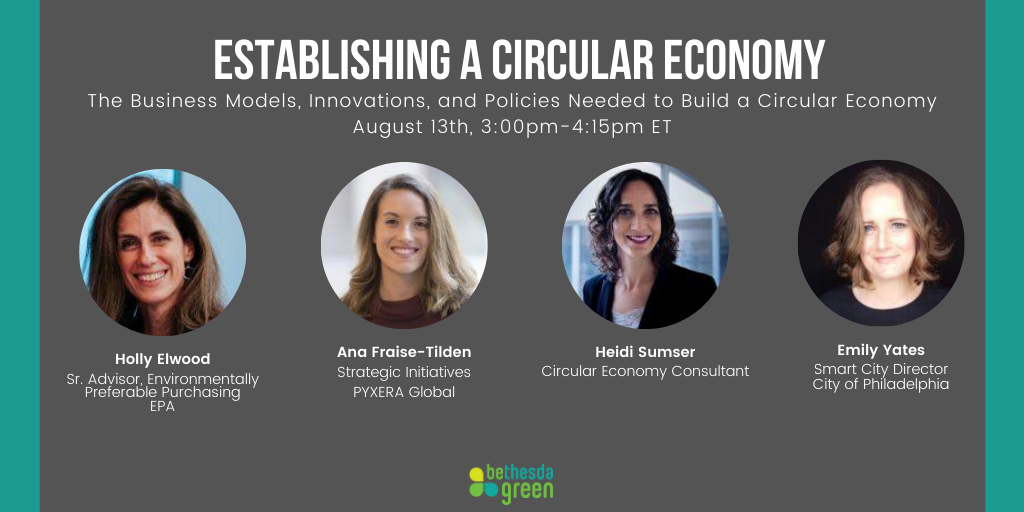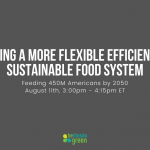Bethesda Green recently completed its Summer 2020 Speaker Series: Tackling Environmental Challenges Through Sustainable Entrepreneurship. This series aimed to educate and inspire prospective entrepreneurs by highlighting gaps in the market, and challenge them to address those gaps with innovative and sustainable for-profit business solutions. During this series, 18 speakers, including founders, industry experts, and policy makers, came together to discuss two primary topics: 1) Building a More Flexible, Efficient, and Sustainable Food System and 2) Establishing a Circular Economy.
The following is a summary of the final session.
Session #5: The Business Models, Innovations, and Policies Needed to Build a Circular Economy
Speakers included Emily Yates, Smart City Director of Philadelphia, Ana Fraisse-Tilden, Strategic Initiatives at PYXERA Global, and Holly Elwood, Sr. Advisor of Environmentally Preferable Purchasing at the EPA. This session was moderated by Heidi Sumser, a Circular Economy Consultant.
Watch the full session on YouTube here: https://youtu.be/dF0WP-7QpZM

Many of the t-shirts, electronics, and buildings purchased by consumers are designed with planned obsolescence; they’re designed well enough to do the job, but they don’t last for long and will eventually need to be replaced. This current extractive system is unsustainable, but a growing movement to promote and develop a circular economy can help.
Heidi Sumser introduced three key tenants of the circular economy: 1) design out waste and pollution; 2) keep products and materials in use; and 3) regenerate natural systems. Instead of simply finding ways to repurpose waste, products should be designed to be easily disassembled at the end of life.
In recent years, the idea of building a circular economy has gained a foothold in city halls around the United States. It represents a paradigm shift away from the current “take-make-waste” model, and treats “waste” as valuable, raw material to recycle and build new goods. This sort of paradigm shift will require mindset transformations at the individual and collective level. Emily Yates experienced this first hand while working for Envision Charlotte in support of the city of Charlotte, North Carolina. The city was struggling to define its brand, and she convinced the city manager to establish Charlotte as a leader in the circular economy, enabling the city to reap both social and economic benefits in the process.
At the time, a 2014 study from Harvard University found that someone born into poverty in Charlotte had only a 4.4% chance of making it to the upper quantile of income in their lifetime, which made Charlotte the worst ranked large American metropolitan area in terms of social mobility. The city needed a change. Recognizing that support from champions in city hall was crucial, Yates worked to convince the city manager that establishing a circular economy would create new economic revenue for the city, establish jobs for underskilled people through innovation creation, and achieve the climate targets they agreed to in the Bloomberg Challenge, an effort by 25 cities to meet or beat carbon reduction goals.
Indeed, the benefits of a circular economy are hard to deny. A 2015 report from McKinsey and the Ellen MacArthur Foundation showed that implementing a circular economy in Europe would reduce CO2 emissions by 48% by 2030, provide 1.8 trillion euros in economic benefits, and increase resource productivity by 3%.
Panelists agreed that public-private partnerships can be a powerful avenue for change. For Holly Elwood, leveraging the federal government’s purchasing power has been impactful when building holistic life cycle standards into the design of electronics. In her work, she identifies products that the federal government purchases with significant volume, so she can use the federal government’s market influence to incentivize sustainable product design and encourage companies to integrate circularity back into the supply chain. The federal government can also incentivize circularity with standards that ensure manufacturers develop take-back programs for end-of-life products, build products that can be easily disassembled, and include recycled content in the product itself.
For example, Dell rose to the challenge and worked with their suppliers to build a closed looped system. They started collecting the hard disk drives from their old products, mining the important materials out of their end-of-life products, and using them in the new servers that they sell today. Other manufacturers saw the work that Dell did, recognized the advantage that Dell was gaining with procurement, and began similar initiatives themselves.
Yates also believes that municipalities can be huge assets for businesses. Though cities may not be able to take the risks inherent with entrepreneurship, they can create the environments and incentives necessary to inspire sustainable innovation. This happens though public-private partnerships, shifts in policy, and by the leveraging procurement power of cities.
Ana Fraisse-Tilden, a Strategic Initiatives professional at PYXERA Global, knows the importance of these partnerships. When working with a municipality or any organization to implement circular economy and zero-waste initiatives, she first works on leadership and stakeholder buy-in. She examines whether leadership is more likely to implement initiatives for economic, environmental, or social reasons, and is able to tailor her approach and show similar examples of successful programs.
She shared the example of Adidas’ partnership with Parley for the Oceans, a partnership that began in 2015 as a pilot program to divert plastic from the oceans and use them in one type of Adidas shoe. The program was an overwhelming success and Adidas has announced that by 2024, they will phase out the use of virgin plastics and polyesters in all of their products. Not only that, but other shoe manufacturing companies have noticed the program’s success and created their own initiatives to use recycled materials in their products.
Tilden believes that strategic partnerships between municipalities, companies, and non-profit organizations are the future. Panelists widely agreed that public-private partnerships unlock the technological innovation, policy changes, and community buy-in necessary to create circular cities and zero plastic waste communities. These large scale societal shifts will create jobs, especially for marginalized community members, and dramatically mitigate environmental degradation.
Summaries and videos to the 2020 Bethesda Green Summer 2020 Speaker Series: Tackling Environmental Challenges Through Sustainable Entrepreneurship can be found here.
About the Author:
Sam Wenger is a Summer Intern at Bethesda Green’s Innovation Lab. He is pursuing a Master of Science in Energy and Sustainability from Northwestern University, and recently graduated from Cornell University with a Bachelor of Science in Operations Research & Information Engineering.




